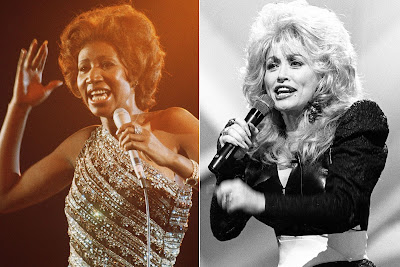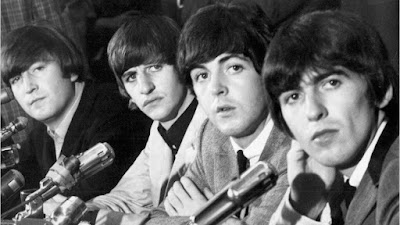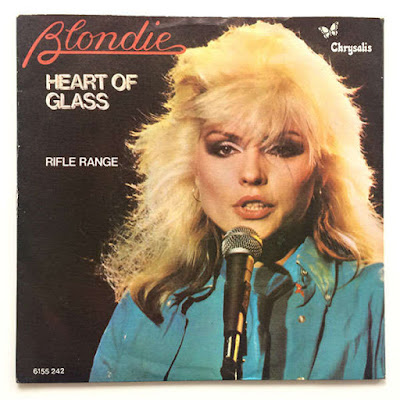Oh how sisters have been doing it for themselves for a long long time now! Dolly Parton and Aretha Franklin that is!
“In 1975, Kitty Wells traveled to Capricorn Studios in Macon, Georgia, to record Forever Young, an album of country, rock and soul songs. Wells was 56 at the time and was looking to modernize her sound and image, just a bit. She hadn’t had a Top Ten country hit in more than a decade and was best known — to most younger fans, she was perhaps only known — for “It Wasn’t God Who Made Honky Tonk Angels,” a country chart-topper from 1952 that, as she later explained, “was just the women getting back at the men.” One of the updating tracks Wells cut in Macon was a soul-country reading of the 1967 Aretha Franklin country-soul classic, “Do Right Woman, Do Right Man.”
If you’ve just listened to Aretha Franklin’s indelible take on that song — if you’ve just done that, say, five or six times in a row as so many of us have done since Franklin’s death on August 16th — then shifting suddenly to Wells’ version is a jarring musical transition. It would be easy to hear the replacement of Aretha’s knowing, even now up-to-date sensuality, melisma and rhythmic phrasing with Wells’ gingham-clad twang and plaintive, on-the-beat quaver as some sort of parody. Attend closely, though, and the stoic-seeming Wells quickly pulls you into her way of singing the world. Typically, she defers any display of tears to her pedal steel guitarist. But very quickly, certainly by the time her old-timey voice moans, “Take me for granted…makes willpower weak and temptation strong,” you take her to heart.
Both “It Wasn’t God Who Made Honky Tonk Angels,” the Queen of Country Music’s signature song from back in the day, and “Do Right Woman, Do Right Man,” one of the Queen of Soul’s late Sixties masterpieces, are delivering a key message to the men in their lives and to the world: “You’d better show some respect for me.”
To call Aretha Franklin the Queen of Soul doesn’t do her justice, or at least not nearly enough. As critic Dave Marsh noted, that title “implies that she ruled in only one sector of the musical universe, when she actually reigned over virtually everything she touched and touched every kind of musical vernacular of her time.” Such reach would presumably embrace even country music. It’s been great then to see Aretha’s influence so widely acknowledged, her legacy Amen-ed and Hallelujah-ed since her death: In the second half of the 20th century, only James Brown and Elvis Presley can touch her. Yet Franklin’s relationship with country music — her use of it and, far more significantly, her impact upon it — remains neglected. But, like Kitty Wells, country acts have frequently used Franklin’s songs and style to modernize their own sounds.
With the power and wisdom of Aretha’s “Respect” still ringing in our ears, it becomes harder to miss all the complexity packed into Tammy’s own career record: how Wynette’s “If you love him, you’ll forgive him” underscores a pretty damn big “if” and how the climax to “Stand By Your Man” — its highest, loudest note — falls hard on contingency: “Keep giving all the love you CAN.”
The obvious reason for that neglect is simply that Franklin recorded very little country music. She cut a version of “Cold, Cold Heart” for a tribute LP to one of her chief R&B forebears, Dinah Washington. Aretha, backed by harmonica and organ, takes Hank to church. That was in 1964, during her early, only intermittently successful Tin Pan Pop period with Columbia Records. Then in 1967, for Atlantic, she did a bluesy, heavy take on Willie Nelson’s “Night Life.” In 1969 she cut a version of “Gentle on My Mind,” the John Hartford-by-way-of-Glen Campbell ode to female patience and male wanderlust. Aretha sounds less and less patient or gentle, and angrier and angrier, as she goes. As far as Aretha singing country songs goes, well, that’s about it. [For a couple more exceptions, check out her best country performances and her cover of a Bill Anderson song.]
Yet Aretha’s impact on country singers has been profound, both as a specific inspiration for generations of country singers, and as a living, breathing ideal of the adoption of soul rhythms and vocal techniques by country music generally. Some male country stars have occasionally cut songs associated with Franklin. In 1981, for instance, Kenny Rogers had a Top 5 country hit with “Share Your Love with Me,” an R&B chart-topper for Franklin back in 1969, and in the mid-Nineties, Clint Black teamed with the Pointer Sisters for “Chain of Fools.” On the evening of Franklin’s death, Chris Stapleton, probably contemporary country’s premier practitioner of the intensely melismatic phrasing of which Franklin was the master, dedicated his own take on “Do Right Woman” to her in concert.
But Franklin’s influence has been most direct among country women, both artists and, as Trisha Yearwood’s “X’s and O’s (An American Girl)” reminds, their fans: “She’s got her God and she’s got good wine / Aretha Franklin and Patsy Cline.” Getting that rhyme to work aside, you could switch out “Patsy” there for Faith Hill, Jo Dee Messina, Reba McEntire (who’s often performed “Respect” live since including it on an album in 1988), Shania Twain, Martina McBride, Maren Morris, Tanya Tucker, and Miranda Lambert, among many others, all who tweeted gushing respect for Franklin last week. Wynonna called her “THE shero who changed my life,” and Dolly Parton released a statement, too, noting, “I’m one of the lucky ones to have seen Aretha perform in the very beginning of her career. She was amazing then and just became greater through the years.”
Indeed, when Parton saw Franklin perform in the 1960s, she was taking notes. “Dolly wanted to be more like Aretha Franklin…,” Porter Wagoner told biographer Steve Eng about his “girl singer’s” pop ambitions and the artistic tensions that eventually led to their split. “She had all [Aretha’s] records, she wanted more punch.”
More punch, more soul, more freedom. Parton wasn’t the only one in Nashville looking to Franklin for ideas, musical and otherwise. Producer Billy Sherrill, who began his career in the same Muscle Shoals scene that would eventually produce Aretha’s breakthrough sides, worked with Barbara Mandrell (“Do Right Woman”) and Jody Miller (“A Natural Woman”) to score hits with country versions of Aretha-associated songs — and he made dozens more that cribbed elements of Franklin’s style. Plus, don’t forget, for awhile there at the turn of the Seventies, it seemed as if every record released by Sherrill’s most famous collaborator, Tammy Wynette, was some sort of answer record to one of Aretha’s.
We’ve become accustomed to thinking of Franklin’s and Wynette’s images and music as something like polar opposites, engaged in the bitterest disagreements — a not unreasonable conclusion. In the moment, though, as now, it’s also possible to hear Aretha and Tammy as engaged in some honest, sisterly conversation with one another and even finding surprising common ground. With the power and wisdom of Aretha’s “Respect” still ringing in our ears, it becomes harder to miss all the complexity packed into Tammy’s own career record: how Wynette’s “If you love him, you’ll forgive him” underscores a pretty damn big “if” and how the climax to “Stand By Your Man” — its highest, loudest note — falls hard on contingency: “Keep giving all the love you CAN.”
Similarly, with Tammy’s tears fresh in our mind, it’s easier to hear Aretha declaring in “Chain of Fools,” against parental advice and doctor’s orders, that at least for the time being, she knows she’s going to be standing by her cheating man. Both Tammy’s and Aretha’s music portray ideals and aspirations, but their hits, like their personal lives, reveal still harder truths. It may be only a coincidence that Aretha’s “R-E-S-P-E-C-T” can be switched out in song for Tammy’s “D-I-V-O-R-C-E,” but it’s a delightful, telling coincidence nonetheless, just one more exchange in a call and response that’s been going on for decades.
After she died last week, a video of Aretha Franklin, on the TV game show What’s My Line? from 1974, went the rounds (sometimes tagged “Aretha Franklin talking to white people”). The blindfolded panelists are having no luck at all guessing Franklin’s identity. Finally, one panelist, Soupy Sales, asks: “Are you very big in the Country & Western field?”
“No, not yet,” Aretha replies.
Then, after a pause: “That would be nice.”
Yes. Yes, it has been. And continues to be.” – Rollingstone.com


















